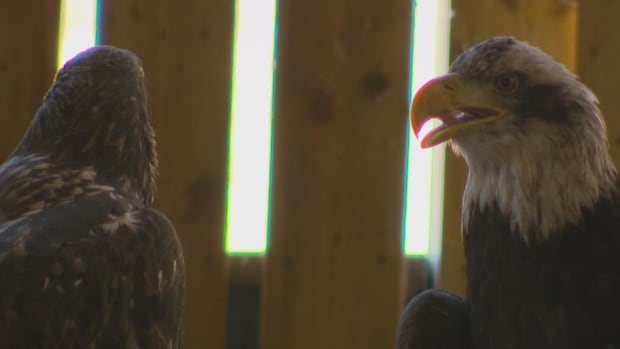Nova ScotiaThe Cobequid Wildlife Rehabilitation Centre in Hilden, N.S., is encouraging anglers to catch chain pickerel and donate them as food for its 10 bald eagles.Cobequid Wildlife Rehabilitation Centre using donated chain pickerel to feed its 10 eaglesThe Cobequid Wildlife Rehabilitation Centre houses 10 eagles in various states of rehabilitation. (Paul Poirer/CBC)Perched high on branches or flying laps in their enclosure, the bald eagles at the Cobequid Wildlife Rehabilitation Centre in Hilden, N.S., wait for people to leave so they can get back to eating.Their caregivers say these massive birds avoid humans at all costs. But indirectly, the eagles are working alongside humans to fight the spread of chain pickerel, an invasive fish species that threatens lakes, rivers and ponds in Nova Scotia.Anglers are being encouraged to catch the freshwater fish and donate them as food for the rehabilitation centre’s 10 bald eagles.”I think they definitely enjoy eating that type of fish,” said Brittany Green, a volunteer who works with the raptors. “I haven’t seen them turn their nose [up] about much, but yeah, they do like the big fish, for sure.”Chain pickerel, introduced to Nova Scotia in the 1940s, are aggressive carnivores with green bodies marked by black, chain-like patterns. Their predatory nature puts native species like trout and salmon at risk, and they have spread through many provincial lakes and ponds.The donations not only help combat chain pickerel populations but also save the centre money by keeping the eagles well fed.The eagles also eat other kinds of fish, chicken and roadkill donated by the Department of Natural Resources.”They eat a lot,” said Green. “An immature eagle can eat like a pound a day and up to several pounds for an immature bird.”Invasive chain pickerel are being used to feed eagles at wildlife rehabilitation centre in Nova Scotia. (Jessica Rock)Dr. Jessica Rock, a veterinarian who volunteers at the centre, said the amount of chain pickerel being donated varies from week to week. Sometimes it’s just a few fish, other times full coolers are donated.But deliveries are consistent, she said, and that has made a real difference. Many donate after a day of sport fishing.”Without local anglers, we’d have a much harder time feeding this many eagles.” said Rock, who is also vice-chair of the centre’s board. “It really is a community effort.”All donated food is X-rayed to ensure it doesn’t contain anything that could hurt the animals at the centre, which rehabilitates orphaned and injured wildlife to be released back into the wild.Chain pickerel are notorious for swallowing hooks, and lead can be especially dangerous for raptors in recovery. Recently, the team was surprised when an X-ray revealed a whole fish inside the belly of a pickerel, likely eaten just minutes before it was caught.An X-ray of chain pickerel shows one fish with a hook in its stomach. Another has just swallowed another fish. (Cobequid Wildlife Rehabilitation Centre)For Green, who has spent eight years volunteering with the centre, seeing the partnership between anglers and caregivers pay off is especially meaningful. “Just to see [the eagles] go from … being so sick and injured,” she said. “The only reason they get a second chance is because of the volunteers here and the doctors, and just getting them another chance to be wild and live their lives.”ABOUT THE AUTHORGiuliana is a journalist originally from Lima, Peru. She is interested in stories about rural Nova Scotia, science, the environment and more. If you have any story tips, you can reach her at giuliana.grillo.de.lambarri@cbc.ca.
Invasive fish lands on menu for hungry eagles at N.S. wildlife centre











